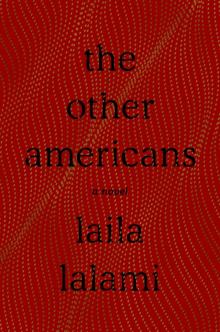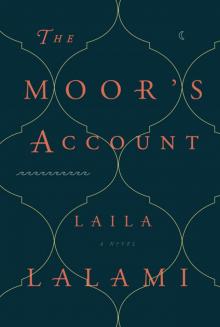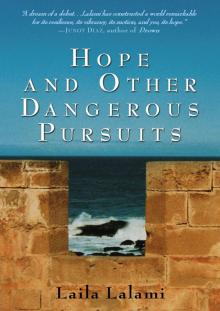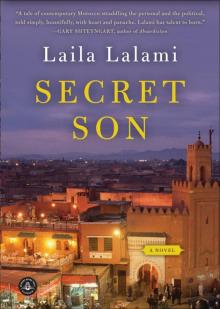- Home
- Laila Lalami
The Other Americans
The Other Americans Read online
ALSO BY LAILA LALAMI
The Moor’s Account
Secret Son
Hope and Other Dangerous Pursuits
This is a work of fiction. Names, characters, places, and incidents either are the product of the author’s imagination or are used fictitiously. Any resemblance to actual persons, living or dead, events, or locales is entirely coincidental.
Copyright © 2019 by Laila Lalami
All rights reserved. Published in the United States by Pantheon Books, a division of Penguin Random House LLC, New York.
Pantheon Books and colophon are registered trademarks of Penguin Random House LLC.
Library of Congress Cataloging-in-Publication Data
Name: Lalami, Laila, [date] author.
Title: The other Americans / Laila Lalami.
Description: New York : Pantheon Books, 2019.
Identifiers: LCCN 2018034022. ISBN 9781524747145 (hardcover). ISBN 9781524747152 (ebook).
Subjects: GSAFD: Suspense fiction. Love stories.
Classification: LCC PS3612.A543 O84 2019 | DDC 813/.6—dc23 | LC record available at lccn.loc.gov/2018034022
Ebook ISBN 9781524747152
www.pantheonbooks.com
Cover design by Janet Hanson
v5.4
ep
Contents
Cover
Also by Laila Lalami
Title Page
Copyright
Dedication
Nora
Jeremy
Efraín
Nora
Jeremy
Maryam
Nora
Driss
Efraín
Jeremy
Nora
Driss
Coleman
Jeremy
Nora
Maryam
Efraín
Jeremy
Nora
Jeremy
Anderson
Nora
Driss
Coleman
Nora
Maryam
Jeremy
Efraín
Nora
Jeremy
Nora
Efraín
Coleman
Nora
Driss
Nora
Jeremy
A.J.
Nora
Coleman
Nora
Salma
Nora
Jeremy
Anderson
Coleman
Efraín
Nora
Jeremy
Nora
A.J.
Jeremy
Maryam
Nora
Jeremy
Nora
Maryam
Nora
Jeremy
Coleman
Anderson
A.J.
Driss
Jeremy
Nora
Acknowledgments
A Note About the Author
For A. and S.
Nora
My father was killed on a spring night four years ago, while I sat in the corner booth of a new bistro in Oakland. Whenever I think about that moment, these two contradictory images come to me: my father struggling for breath on the cracked asphalt, and me drinking champagne with my roommate, Margo. We were celebrating because Margo had received a grant from the Jerome Foundation to work on a new chamber piece, her second big commission that year. We’d ordered steamed mussels and shared an entrée and lingered late into the night. The waiter was trying to convince us to get the chocolate mousse for dessert when my phone rang.
I have no clear memory of what happened next. I must have told Margo the news. We must have paid the bill, put on our coats, walked the five blocks back to our apartment. A bag was packed, somehow. But I do remember driving home on the 5 freeway, in the foggy darkness that cloaked almond groves and orange orchards, all the while dreaming up alternate explanations: perhaps the sheriff’s department had misidentified the body, or the hospital had swapped my father’s records with someone else’s. These possibilities were far-fetched, I knew, and yet I clung to them as I drove. Under my headlights, I could see only twenty feet ahead. But the fog lifted at dawn, and by the time I reached the Mojave, the sun was out and the sky a brazen blue.
All I could hear when I stepped into my parents’ house were my heels on the travertine floor. There was a copy of Reader’s Digest on the console, a set of keys on a yellow wrist coil, and a pair of sunglasses with a missing lens. One of the framed photos on the hallway wall was askew. In the living room, my mother sat on the sofa, staring at the cordless phone in her hand as though she couldn’t remember how to use it. “Mom,” I called, but she didn’t look up. It was as if she couldn’t hear me. She was still in the white shirt and black gi from her karate class the night before. Across the ottoman, the jacket of her uniform lay in a heap, the dragon appliquéd on its back a startling red.
It seemed to me then that my father was still with us—in the half-empty packet of Marlboros on the windowsill, the frayed slippers under the coffee table, the tooth marks on the pencil that stuck out from the book of crossword puzzles. Any moment now, he would walk in, smelling of coffee and hamburgers, saying, You won’t believe what a customer told me this morning, and then, seeing me standing by the armchair, call out, Nora! When did you get here? His eyes would gleam with delight, he would kiss me on the cheeks, the stubble on his chin would tickle me, and I would say, Now. I just got here now.
But the doorway remained empty, and pain kicked me in the stomach. “I don’t understand,” I said, though what I meant was that I didn’t believe. Disbelief had been the only constant since I’d heard the news. “I just talked to him yesterday.”
My mother stirred, finally. She turned to me, and I saw that her eyes were rimmed with red and her lips cracked. “You talked to him?” she said, not without surprise. “What did he say?”
From the hallway came the rattle of the mailbox slot and the thump of the mail as it hit the floor. In its wicker basket, the cat raised its head, then went back to sleep.
“What did he say?” she asked again.
“Nothing. He said he wanted to chat with me for a bit, but I had to go teach and I wanted to get a cup of coffee in the few minutes I had left on my break. I told him I’d call him back later.” My hand flew to my mouth. I could have talked to him one more time, heard the care in his voice, and yet I had squandered the chance. And all for some bitter coffee in a paper cup, hastily consumed before confronting a class of bored prep-school kids making their way through The Odyssey.
A motorcycle roared up the street and the windows shuddered. Nervously I undid the folding clasp on my watch and clicked it back in place. Then a grim silence fell on the room again. “What was Dad doing at the restaurant so late?” I asked. “Doesn’t Marty usually close up?”
“He wanted to install new lights he bought, so he told Marty to go home.”
And then what? He must have locked up the restaurant and walked out. Maybe he was jiggling his keys in his hands, the way he always did when he was lost in thought, or maybe he wa
s distracted by a text on his cell phone. Either way, he didn’t hear or see the car barreling down on him until it was too late. Had he suffered? Had he called out for help? How long had he lain on the asphalt before his breath ran out? Unbidden, a memory came to me of a summer party at the neighbors’ house when I was four years old. They’d recently remodeled their backyard, and were showing off their new barbecue pit and seating nook to my parents. My sister ditched me; she was ten and wanted to play with the older kids. I started chasing after a pair of dragonflies, but just as my fingers closed around one of them, I fell into the pool. The water was icy and tasted like almonds. It drew me to the bottom with such force that I felt I would never draw another breath again. I was in the pool for only an instant before my father dove in after me, but in that instant my limbs froze, my chest burned, my heart nearly stopped. That pain came back to me now. “Something doesn’t seem right,” I said after a moment. “The one time Dad stays for close, he gets run over and killed?”
I realized too late that I had said the wrong thing, or used the wrong word. My mother began to weep. Loud, unguarded sobs that made her face flush and her shoulders heave. I crossed the living room, moved the rolled-up prayer mat out of the way, and sat beside her, holding her so close that I could feel her tremors. Everything about this moment felt strange to me—being in this house on a weekday in spring, wearing my shoes indoors, even comforting my mother as she cried. In my family, my father was the consoler. It was to him I came first whenever something bad happened to me, whether it was scraping my knee on the monkey bars when I was eight, or losing another composer competition just a month earlier.
My mother wiped her nose with a crumpled tissue. “I knew something was wrong when I came back from your sister’s house. I went there to drop off karate patches for the children, and she asked me to stay for dinner. Then I came home, and he wasn’t here.”
Yet the armchair where my father usually sat still bore the imprint of his body. It was as if he were only in the next room.
“What did the police say?” I asked. “Do they have a lead?”
“No. The detective just asked a lot of questions. Did he have money troubles, did he use drugs, did he gamble, did he have enemies. Like that. I said no.”
I remember being puzzled by these questions, which were so different from those that swirled around in my head: who was driving the car and how did they hit him and why did they flee the scene? Then my gaze was drawn to the window. Outside, two blackbirds landed one after the other on the electric wire. The neighbor across the street was deflating the giant Easter bunny that had sat for weeks in his front yard, gathering dust. It stared back with grotesque eyes as its white ears collapsed under his shoes. The wind whipped the flag on the pole, and the sun beat down without mercy.
Jeremy
Back then I was struggling with insomnia, and I would go to the gym right when it opened, at five a.m. The doctor had told me that regular exercise would help. She told me a lot of things would help. Hot baths. Blackout curtains. Reading. Chamomile. I took long baths, I read before bed, I drank cup after cup of chamomile, but most nights I still lay awake, listening to the clock on the bedside table ticking in the silence. I’d tell myself, If you fall asleep now, you could still get four hours of sleep, or three hours, or two. As if I could reason myself into sleeping. Then, a little before five, I’d get up and head to Desert Fitness.
That morning, I had finished my cardio and was doing my crunches when Fierro came in. The gym was mostly empty at that time, so I was glad for the company, though he wouldn’t stop talking about his ex. This was right after he and Mary separated, and I think he was still in denial about it. His chattering made me lose count, and I had to stop and start twice before I was sure I’d completed my set. Fifty regular, fifty reverse, fifty double, fifty bicycle. I had another twenty minutes before I had to leave for work, but just to be safe, I skipped the biceps curls and went to the bench press. I liked to take my time when I lifted weights. Still do. I set myself up with two hundred and fifty pounds and settled down on the bench but, without so much as asking for permission, Fierro added fifteen pounds on each side of my barbell. “What’re you doing?” I asked.
“Dude, come on. No point in doing it if you’re not doing it right.” He stood behind the bench, ready to spot me. Waiting, really. He was in a gray One Shot, One Kill shirt, with the short sleeves rolled up to show off his muscles.
“Doing it like you, you mean.”
He leaned to the left, giving me his good ear. “What’s that?”
“Never mind,” I said. I could argue with Fierro, or I could start lifting and get to work on time. I started lifting.
“Anyway,” he said, “last night I found out Mary didn’t change the spark plugs on the Mustang, even though I reminded her about it three times. She’s going to ruin that car. Dude, take a break if you need one.”
I could feel beads of sweat on my forehead, but I pressed on. I didn’t want to give Fierro the satisfaction. We could be competitive with each other about certain things, going back to our days in the Marines. A blonde in a black leotard walked in and Fierro’s eyes instinctively tracked her all the way to the locker-room doors. He sucked on his teeth. “So I told Mary I wouldn’t sign the divorce papers until she gave me the keys.” He said this like he was proud of it, like he’d finally taken a stand.
“Isn’t it her car, though?” I asked. I’d ridden in that Mustang a few times, after Fierro and I came back from Iraq. I’d sit in the back, sipping on whiskey from my flask, while Mary drove us to wherever we were going, a bar or a club. Whenever she turned or changed lanes, a silver-plated angel ornament swung from its chain on the rearview mirror. I remember one time, she was talking about the bachelorette party she’d gone to while she was in Vegas with her friends from work when Fierro interrupted her. You never told me about no bachelorette party, he said. That was one of their earliest fights, and the fighting had never stopped, even after they’d split up.
“Her car? Who put the down payment on it? Who replaced those crappy hubcaps with chrome wheels? Who installed redline tires just this last summer?” Fierro turned his thumb, crooked because of an old fracture, to his chest. “It was me. I did it.” Now he put his hands over the barbell. “Come on, Gorecki. Take a break.”
“I’m fine,” I said. I didn’t have much time for a break. If I was late to work, Vasco would chew me out. For a while now, he’d been waiting for me to slip up, just so he could say he needed to look at the schedule again and why didn’t I take a different shift? I couldn’t figure out why the guy hated me so much. I finished my last few reps in silence, then sat up on the bench to catch my breath. My shirt was soaked and stuck to my chest. “Didn’t you tell me she was seeing someone?” I asked.
“What’s that? Man, the music is so loud in here.”
“You told me Mary was seeing some guy.”
“Yeah.”
“So she’s not coming back. Just sign the damn papers already.”
“Fuck, no. She thinks she can just move on. Erase the past like it never happened. Like I never happened. Well, she’s wrong.” He added twenty-five more pounds on each side of the barbell and sat down to do his reps, lifting in a steady rhythm, breathing in and out effortlessly.
I wiped my face with my towel and watched him for a minute. He’d been spending a lot more time at the gym since he’d separated from Mary. Sometimes, he worked out twice a day. “So my sister is having a barbecue,” I said. “Wanna come with?”
“Sure. If it’s okay with her.”
“Of course it’s okay. I don’t want to go alone. You’d be doing me a favor, really.”
“All right. When?”
“Day after tomorrow.”
Ten minutes later, I was in my Jeep, the engine rattling in the quiet of the morning. The rising sun colored the sky a rusty red and as I drove down the 62, I lowered the window s
o I could feel the last of the cool morning air. Lights came on in coffee shops and diners like eyes blinking open. At the station, I changed into my uniform and rushed to the conference room, only to find I was the last one there and the sergeant’s briefing had already started. I settled into a chair and avoided eye contact with Vasco, who was halfway through reading the previous night’s reports in his monotone voice.
“Stabbing on the 5500 block of Shadow Mountain Road. The suspect was upset that his mother was moving out to go live with a man she’d just met. He pulled out a knife and slashed the boyfriend’s arms three times. Dog attack on the 3200 block of Bermuda Ave. The owner had repeatedly been warned about his pit bull, but he let it loose in the yard and it jumped over the fence and attacked the neighbors’ kid. Fatal hit-and-run on the 8300 block of Chemehuevi, corner with Highway 62. Nothing yet on the runaway car. Tagging at the high school overnight. Second incident this week. That’s about it.” As he gathered his papers into a file folder, he looked around the room at all the deputies. “One last thing. There’s been a lot of chatter on social media about the Bowden incident. People see ten seconds of cell-phone footage and they think they know what happened. Don’t pay attention to that. We’re not here to be distracted by what people say online. We’re here to do our job. Stay focused.”

 The Other Americans
The Other Americans The Moor's Account
The Moor's Account Hope & Other Dangerous Pursuits
Hope & Other Dangerous Pursuits Secret Son
Secret Son